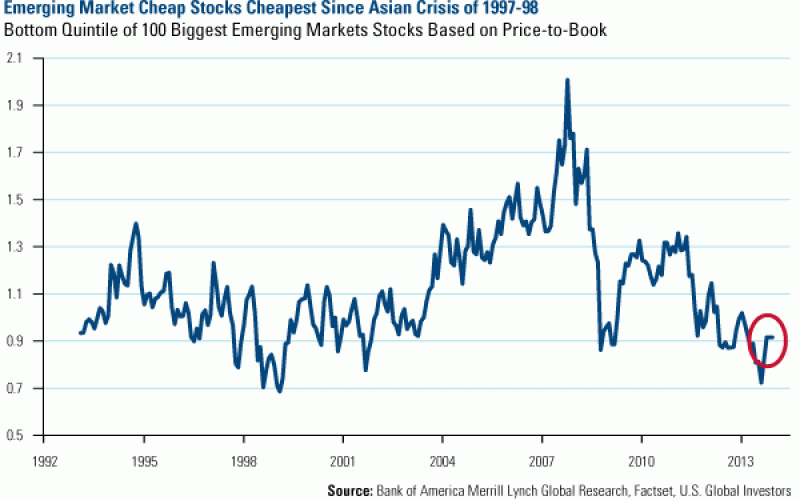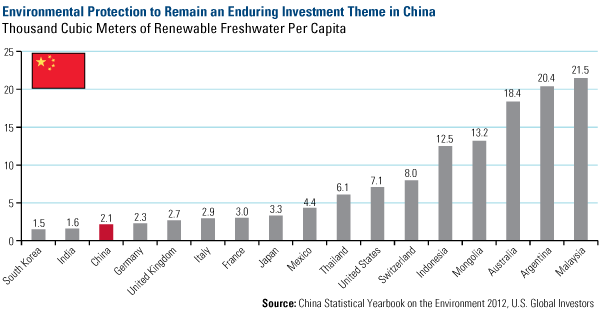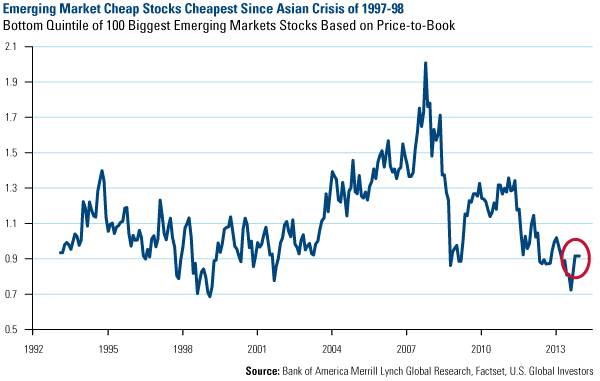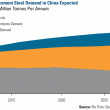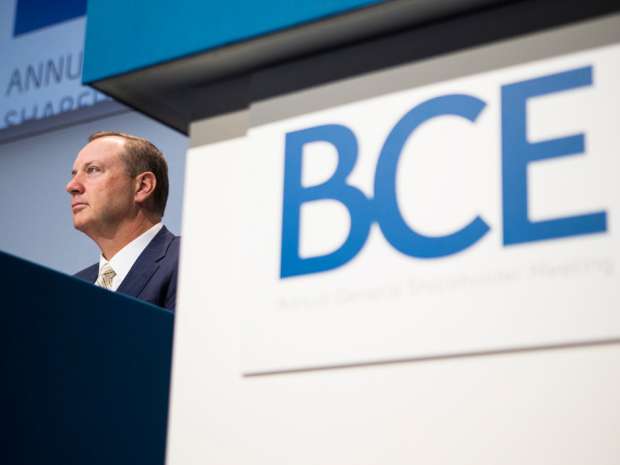Emerging Markets Radar (December 16, 2013)
Strengths
- China’s mid-December Central Economic Work Conference closed today. The government believes that economic growth will stabilize and improve, although downside risk continues to persist. The annual conference did not provide a GDP target in its general news release, leaving the economy to decide. Environmental risks and protections were addressed in the meeting.
- China’s November exports accelerated by 12.7 percent year-over-year, handily beating the market consensus of 7 percent. For November, China’s consumer price index (CPI) was 3 percent, slightly better than the market consensus of 3.1 percent. The producer price index (PPI) was -1.4 percent versus the consensus of -1.5 percent, showing slight easing of deflation in the mid-stream product price.
- China’s new bank loans for November were Rmb 624.6 billion versus the consensus of Rmb 580 billion. Total social financing was Rmb 1.23 trillion versus Rmb 920 billion. Money supply (M2) was up 14.2 percent and in line with the consensus.
- China’s industrial production was up 10 percent in November, slightly lower than estimate of 10.1 percent and 10.3 percent in October. Fixed asset investment rose 19.9 percent year-to-date, while the November fixed asset investment growth slowed to 18.2 percent, mainly due to de-capacity in the manufacturing sector. Property investments in China rose 19.5 percent in the first 11 months of 2013, up 0.3 percent from October, but investments in November increased 22.1 percent year-over-year (7.1 percent month-over-month) primarily driven by new housing starts growth, which was up 58.6 percent in November. Retail sales were up 13.7 percent in November, beating the market consensus of 13.2 percent. China’s macro data shows that the growth momentum continues, though it eased a bit in November.
- China introduced its own 401(k)-style tax-deferred corporate annuity system, with the individual contribution being up to 4 percent of a person’s monthly salary in the previous year (capped at 300 percent of the average salary in the local city). Investment income will be tax deferred, and at retirement when individuals start to withdraw their retirement annuity, income tax will be assessed. Corporate pension plans are using insurance companies as their trustees.
- China’s locally-made passenger car retail volume (excluding exports and minivans) was up by 17.7 percent year-over-year in November, and up 8.3 percent month-over-month.
- Korea’s November jobless rate declined to 2.9 percent, and Bank of Korea, the central bank, kept its benchmark rate unchanged this week.
- Malaysia’s industrial production in October was up 1.7 percent, above the consensus of 0.8 percent, and 1 percent in September.
- Bank of Indonesia kept interest rates unchanged this week, in line with the market expectation. A weak currency actually helped the foreign reserve account go up by $2 billion as businesses and individuals are saving foreign currencies.
- Turkey's economic growth rose 4.4 percent in the third quarter from the prior year, according to the Turkish Statistical Institute. The rate was below the second quarter's 4.5 percent rise, but above the expected 4.2 percent increase. Household consumption rose 5.1 percent, construction rose by 8.7 percent and manufacturing rose by 4.9 percent, while private sector investment increased for the first time in almost two years. Exports rose by 2.2 percent for the quarter, but may be set for a bigger boost as Western nations loosen trade sanctions with Iran, which has traditionally been a strong market for Turkish exports.
- Industrial production in the Czech Republic increased 3.5 percent in October from the prior year, with output of industrial companies growing steadily since July. Production of car manufacturers rose by almost 10 percent over the same period. This helped pull the Czech economy out of a record-long recession, as they captured improvements in demand from foreign markets.
Weaknesses
- Taiwan exports recovered to flat year-over-year growth in November, but were below market expectations.
- Currencies in Indonesia, Thailand and the Philippines depreciated against U.S. dollar since the end of October.
- Industrial output in the eurozone surprisingly fell last month, with recovery continuing to remain shaky. Industrial production dropped 1.1 percent from last month after falling 0.2 percent the previous month, missing the consensus for a rise of 0.3 percent. From last year, output increased 0.2 percent, but came in well below forecasts of 1.1 percent. Among the member states for which data was made available, industrial production rose in 2012 and fell in 2011.
- Options prices for Brazilian stocks have risen to a five-year high relative to the U.S., as implied volatility on South America’s largest nation doubles that of the S&P 500. The increase in options prices signals investors are positioning for continued underperformance of Brazil’s stock market as economic growth falters. A Bloomberg Global poll last month shows investors have never been more pessimistic about Brazil, with only 10 percent of respondents saying the nation can avoid a credit downgrade next year, in addition to high inflation dampening earnings growth.
Opportunities
- As shown in the chart above, China is facing a difficult environmental situation as industry develops, urbanization accelerates and population rises rapidly. Water shortage, among the lowest renewable freshwater per capital, is merely one of the environmental issues. China will continue to support clean energy and clean environment businesses.
- As you can see in the chart, the bottom quintile of the biggest 100 emerging market stocks are currently trading at a median of 0.9x price-to-book, a level not seen since the Asian Crisis of 1997-1998. The majority of the stocks trading in this group are state-owned enterprises (SOEs). Bank of America Merrill Lynch believes the low valuations for SOEs are unwarranted for three reasons: 1) Sovereign balance sheets are thinning out and governments are being forced to cut subsidies and allow SOEs to charge market prices; 2) Recent political transitions in China, Mexico and other nations are getting the reform ball rolling in regards to privatizations, and in addition, 14 emerging nations will have general elections in 2014; 3) The SOE sector is often the epicenter of corruption perception, with policy makers understanding that an increase in SOE transparency is contributive to their constituency.
- India’s stocks hit a new all-time high on Monday as election results confirmed the opposition Bharatiya Janata Party secured four of five seats in the regional elections held last month. The results increase momentum for the nation’s main opposition party, and its prime minister candidate Narendra Modi, who has overseen annual economic growth of 10 percent on average in his province of Gujarat. The main economic driver behind this impressive growth has been infrastructure spending, of which India has a substantial deficit. A nationwide implementation of his model for development, together with his platform of limiting bureaucracy and minimizing government interference with private enterprise, could drive a new economic growth boom for the world’s second-most populated nation.
Threats
- Thailand’s parliament dissolved although political uncertainties continue. This may affect the plan to build the country as a trade hub for Association of Southeast Asian Nations (ASEAN) by connecting China with high-speed trains.
- Russia’s central bank will likely continue to leave interest rates unchanged for a fifteenth month after inflation accelerated more than forecasted by economists in November. CPI accelerated to 6.5 percent in November, breaching the central bank target of 5 percent to 6 percent for a fifteenth consecutive month. Central Bank Chairman Nabiullina has defied predictions that she would reduce borrowing costs to stimulate the economy, instead using alternative monetary policy tools to try to spur anemic economic growth in Eastern Europe’s largest nation.
- The Czech market was pulled up by banks and financials mid-week after several days on the downside, as the emerging government coalition failed to reach an agreement on a proposed financial sector tax. After six weeks of negotiations, the Czech Social Democrats agreed to create a coalition with the Christian Democrats and the ANO party, putting aside differences and focusing on finding ways to fund an economic stimulus program following a record-long recession. Despite strong lobbying by the Social Democrats to introduce higher taxes on banks, the other coalition parties succeeded in pushing the discussion until next year, arguing time constraints won’t allow a timely change to the 2014 tax regime. While the current decision is positive for banks and financials, it is safe to assume the Social Democrats will continue to lobby for the introduction of the tax increase, a possibility that cannot be ruled out for a later time.





